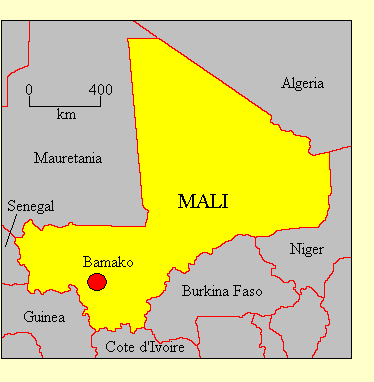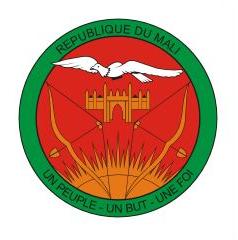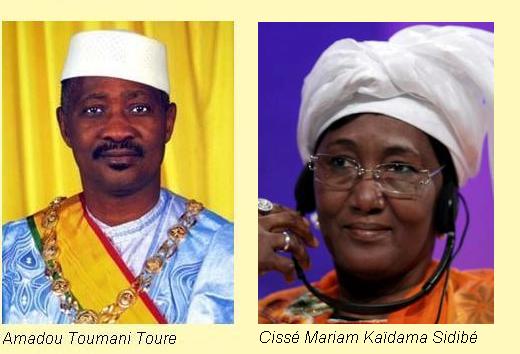

REPUBLIC OF MALI
• Official name: Republique de Mali (Republic of Mali)
• Location: West Africa
• International organisations: African, Caribbean and Pacific Group of States, African Union,
Non-Aligned Movement, Organisation Internationale de la Francophonie, Organisation of Islamic
Conference, United Nations, World Trade Organisation
• Borders: Algeria, Burkina Faso, Cote d'Ivoire, Guinea, Mauretania, Niger, Senegal
• Coastline: None
• Land area: 1,240,000 Km2
• Population: 14,400,000
• Annual GDP (PPP) per capita: US$1,200 (2009 CIA estimate). World ranking: 172
• Ethnicity: Most of Mali's people are of Sudanic West African stock. The largest
groups are the Bambara (31%), the Fulani (14%), Senufo (12%), Soninke (9%) and Tuareg (8%).
• Languages: French is the official language. Most of the population speak Bambara or
related West African languages.
• Religion: About 90% of the population are Sunni Moslems. The remainder follow
indigenous beliefs.
• Form of government: Presidential democratic republic. Mali is divided into eight regions.
• Capital: Bamako
• Constitution: The
Constitution of the Republic of Mali came into effect on 12 January 1992.
• Head of state: The President, elected by direct universal suffrage for a five-year term.
• Head of government: The Prime Minister, appointed by the President. The Prime Minister
is the leader of the largest party in the legislature and is accountable to it.
Cisse Mariam Kaidama Sidibe
has been Prime Minister since 3 November 2011.
• Legislature: Mali has a unicameral legislature, the
National Assembly (Assemblee
Nationale), which has 160 members elected for five-year terms. Of these, 147 are elected
from single-member constituencies and 13 are elected to represent citizens of Mali abroad.
• Electoral authority: The Independent National Election Commission (CENI)
administers national elections.
• Freedom House 2011 rating: Political Rights 2, Civil Liberties 3
• Transparency International Corruption Index: 27% (116 of 178 countries rated)
• Reporters Without Borders Press Freedom 2010 Index: 92% (26 of 178 countries rated)
• Heritage Foundation Economic Freedom 2010 Index: 56.3% (114 of 178 countries rated)

Political history
The area which is now Mali was the site of great African and Islamic civilisations
during the mediaeval period. From the 16th century it was under the nominal sovereignty
of Morocco. The French penetrated the area in the late 19th century and annexed it in stages
between 1881 and 1895. A nationalist movement arose in the 1950s, and Mali became self-governing
within the French Union in 1958 and independent in 1960.
The nationalist leader Modibo Keita became President, but in 1968 he was
overthrown in a coup and replaced by Moussa Traore, who set up a one-party military
regime. This regime held power until 1991, when another coup brought
Amadou Toumani Toure
to power. Toure set up a Transitional Committee for the Salvation of the People, under
whose auspices a new Constitution was drawn up. Free elections were held in 1992 and
Alpha Oumar Konare was elected President. Toure returned to power in 2002 as an
elected President.
The largest parties in the legislature are President Toure's
Alliance for Democracy in Mali-Pan-African Party for Liberty,
Solidarity and Justice (ADEMA-PASJ), a social democratic party. Toure is also supported by the
Union for the Republic and Democracy (URD). The main opposition party is the
Rally for Mali (RpM) which supported Ibrahim Boubacar Keita's
presidential candidacy in 2007.
Freedom House's 2011
report on Mali
says: "Mali is an electoral democracy. During the 2007 presidential election, voting was peaceful,
and the results were deemed valid by domestic and international observers...
A number of anticorruption initiatives have been launched under Toure's administration, including the
creation of the Office of the General Auditor. However, corruption remains a problem, particularly in
public procurement and contracting... Mali's media have been considered among the freest in Africa...
Freedoms of assembly and association are respected. Many civic groups and nongovernmental organizations (NGOs),
including human rights groups, operate without interference... The judiciary is not independent of the
executive and is too weak to provide an adequate check on the other two branches of government."
Updated November 2011
|

